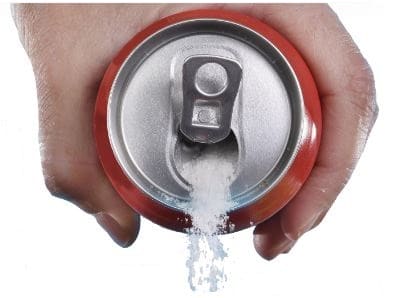
The UK sugar tax: A sweet or sour move?
pharmafile | May 3, 2018 | Feature | Business Services, Manufacturing and Production, Medical Communications, Research and Development, Sales and Marketing | UK, obesity, pharma, sugar tax
Dr Daniel Bailey, Senior Lecturer in Health, Nutrition and Exercise at the University of Bedfordshire, discusses the benefits of the divisive Soft Drinks Industry Levy put into effect by the UK Government in April.
Could you tell me about the aims of the sugar tax and how the industry has responded?
The ‘sugar tax’ was introduced on the 6 April and, essentially what the tax aims to do is put an additional cost to the consumer for those soft drinks that have added sugar going beyond the threshold [5g per 100 millilitres, taxed at 18p per litre, and 8g per 100 millilitres, at 24p per litre] will be hit by the levy. This means that consumers will have to pay more to buy that product and the hope is that they chose other soft drinks, which have less sugar in. The other target of the levy is to encourage manufacturers to, instead of being taxed, reduce the amount of sugar they put into their product. The two keys aims of the levy are to reduce numbers of individuals deemed overweight or obese, and also to reduce levels of tooth decay, particularly in children.
What has been the immediate impact of the sugar tax, either in the run up or after its introduction?
When it became known that this sugar tax was going to be introduced, a number of manufacturers made changes to their products. By changing their recipes to reduce the amount of sugar, their product don’t get taxed, therefore they hope that consumers will continue to purchase their products, even though they may have less sugar in them. A couple of examples: Ribena and Nestle have done that; Coca Cola have decided not to make any changes. The first two examples, however, show an the immediate impact and if consumers continue to buy their products at the same rate as before, that then essentially means that they will have less added sugar within their diet. So, there may be an immediate benefit on the health of consumers thanks to the introduction of the tax.
Is a huge corporation like Coca Cola choosing not to change their recipe a cause for concern?
At this stage they’ve decided not to make any changes to their recipe. Alternatively, what I think they are considering doing is making changes to the volumes of the drinks that they do sell. One way to avoid the tax is to reduce the size of drinks – the cans or the bottle, for example – therefore they’re not going to breach the taxable threshold. I think that is the option that the Coca Cola Company may be considering and other manufacturers as well.
What has been the consumer reaction, so far?
There has been a lot of consumer reaction, particularly on social media, and it’s been quite mixed. For individuals that purchase a lot of these added sugar drinks, a number of them are concerned because they still want to purchase the same products but are having to pay more for them. However, you have consumers at the other end of the spectrum where they’re now purchasing that have lower amounts of sugar in and, as long as the taste of that drink hasn’t been substantially affected, they will see benefit to consuming less sugar.
There’s a case to be made that a lot of parents will see the benefits to this because if the drinks that their children are consuming have been reduced in sugar, that then means they can purchase them for their children knowing that there’s now less sugar in them – meaning that their body’s weight levels or the health of their teeth can be improved.
Are there any exceptions to the rule?
If a product is 100% fruit juice and hasn’t had any added sugar, on top of the fruit, then it’s not taxable. The reasons for this are that fruit juices, alongside the sugar, are packed full of nutrients, vitamins and minerals that are beneficial to our health. For example, orange juice contains a lot of vitamin C, which we know has a number of health benefits for the body, so if we were to tax these types of products this would discourage consumers from purchasing products that would be beneficial for their health. Compare this with other soft drinks that have added sugar in to enhance the taste, but they have no benefit whatsoever in terms of vitamins and minerals, and are what you could consider empty calories.
How does the sugar tax play into long-term plans to improve public health?
I think it’s definitely a positive step but I see it more as a starting point – hopefully it’ll be a primer to promote other policies that we will see introduced in the future. Some consumers will buy soft drinks in large amounts while there are many other consumers who don’t buy these drinks but instead purchase foods that contain added sugars that are processed or very high in fat. This part of the diet isn’t being tackled at all by this form of tax. The sugar tax won’t change consumers’ views or spending habits in regards to the food products they purchase; there may be an aspect of some consumers’ diets that won’t be impacted at all, even though it may be very harmful to their health. The sugar tax is a good step; it tackles one aspect of diet but there still needs to be greater policy and regulation around food products as well, in my opinion and that of a number of researchers and public health figures.
Could you provide examples of policies/regulation that you would like to see introduced in the future?
If the government believes that taxing foods is beneficial, and if that is shown over the next few years with the soft drinks tax, then it may be another positive step to introduce a similar tax on foods that contain added sugar. For example, taxes could be introduced on biscuits or cakes, which is a measure that has been introduced in other countries. To go even further than that, if we consider foods that are considered junk food then they may also need to be tackled, with the amount of fat that they use in preparing their products and the levels of salt that is being added. Facing up to added sugar, fat and salt in foods are three key areas that need to be addressed going forward that would complement any benefits we see from the sugar tax.
How far can governments influence the behaviour of multinational corporations?
It’s very challenging but if we take the sugar tax as an example, the fact that we’re seeing a number of large manufacturers already make changes to their products shows that some legislation and policy can have an impact, in that respect. It may not be wise to try implement too many regulations at the same time, but if we do see positive results from the sugar tax then I think the government may see that as promising and consider introducing more strategies that the manufacturers will be receptive to.
An idea that has been floated by some commentators is to tax junk food to subsidise healthier food – how realistic do you think this is as a prospect?
That could be something that could be considered in tandem with taxing products that are less healthy. On consumers’ shopping bills, if they add a lot of fruit then it becomes very expensive, so for that reason consumers choose to purchase foods that are a lot cheaper, which have a lot less nutrients that are important for overall health. I think that would be a particularly good step, although I don’t think that’s even being considered at government level yet. Hopefully that would be the case in the future.
How does reducing levels of obesity across society have positive impacts beyond an individual’s health?
As most people are aware, obesity is a major public health burden as it has major implications for disease risk: being overweight or obese increases risk of type 2 diabetes, heart disease, some cancers and is associated with poor mental health. This has a burden on the individual, in terms of quality of life, but also a massive burden on the NHS. It also has an impact on the wider economy of the UK, costs to the NHS and employers, with these individuals potentially needing to take time off work because of being ill due to poor health or being at work whilst being sick and therefore being unproductive. This can cost the economy billions of pounds as well. We know that 90% of people living with type 2 diabetes are overweight or obese; this disease alone takes up 10% of the NHS budget – it costs the NHS around about £10 billion, annually. If we could tackle obesity then it could have massive benefit for the NHS in this area alone, and then if we factor other disease areas then the benefits would multiply.
Related Content

LGC Group opens $100M Organic Chemistry Synthesis Centre of Excellence
LGC Group, a life sciences company, has opened its new Organic Chemistry Synthesis Centre of …

FDA approves Wegovy for treatment of MASH in adults with liver fibrosis
The US Food and Drug Administration (FDA) has granted accelerated approval for Wegovy (semaglutide) as …

Lilly reports positive results from trial of obesity candidate
Eli Lilly and Company (Lilly) has announced topline results from its phase 3 ATTAIN-1 trial, …






